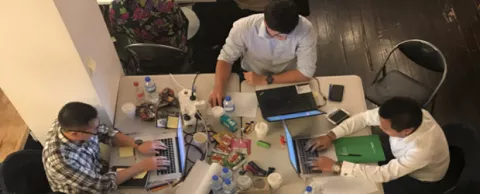
"My fellow smart cities ambassadors, ask not what can you do for the hackathon, ask what can the hackathon do for your city." Well, it’s not a famous quote, yet, but I like the idea behind it.
Let’s make no mistake, the hackathon is not a fringe, underground cult thing. It’s not a nerdy computer hacker club. It's not just for twenty-somethings who like pizza and Red Bull-fuelled weekends.
This is a tool for city transformation, and market acceleration, and a tool to build the skills our government and industry so desperately needs to equip ourselves for the ongoing task of solving our most wicked urban problems.
Let’s break the hackathon down a little, and keep it simple. Typically, from the hackathons I have attended, it goes a little something like this: A group of strangers gather, with their tools in hand (computer, enthusiasm, hunger for problem solving), where a set of challenges is presented (often wicked, systemic, and complex). They form teams, work relentlessly to create a solution, and then pitch their solution to a group of peers, and ask for feedback. They then wrap, and all go home (sometimes with a prize in hand).
And this process of rapid problem solving generally takes place over a 48hr period. Not a three-month consultancy process, and not a week-long design-thinking excercise. This is rapid problem solving, rooted deeply in collaboration. And the collaboration, I believe, is the secret ingredient that makes it as successful as it is.
But collaboration goes well beyond just working together, it requires a high level of trust among participants, the ability to ‘let go’, the sharing of power, and fundamentally being inclusive. Many attributes I believe the ‘start ups’ could help teach us ‘grown ups’.
So, what’s going on in Australia, with respect to smart cities hackathons?
I asked a few leaders in the field what their thoughts were of hackathons being used to help build smart cities of the future.
Below is a vignette of their responses.
Over coffee in Canberra last week, Kevin Keith, Strategy Director for GovHack, gave me the debrief on their recently completed national hackathon. With more than 2,300 participants from every state and territory in Australia, and now including New Zealand, this annual event (which has been running since 2009) just gets bigger and bigger.
When I asked him of the value of the hackathon in building smart cities, he replied, “the value of data is intrinsically linked to the value we place in each other. This is why GovHack is so important.”
Keith continued by saying “debate around ownership (of data) will only turn a corner when we turn to each other and collectively work back from that singular objective: to make life better now and for years to come. It expands the definition of us and shrinks the definition of them. Government alongside community alongside industry, strengthening democracy and solving challenges through the knowledge and creativity of the many for the many.”
Colette Munro, Chief Digital Officer at AECOM, recently orchestrated AECOM’s own hackathon (CityHack) and spoke of the benefits both internally and externally to the project. Munro stated that “setting up and hosting two CityHack events in the past year has really helped AECOM to understand the state of innovation in the infrastructure sector.”
She went further to state, on the importance of diversity in the room, that “the range of backgrounds, expertise and thinking that was applied over one weekend highlights the creativity and passion for solving big problems amongst our staff, clients and the broader industry.” She added that “this was a timely reminder for everyone involved that the best solutions are found at the nexus of collaboration and risk.”
Johanna Pitman, Program Director of CityConnect, BlueChilli’s smart cities accelerator, spoke to me about the five hackathons they have run this year alone. Pitman said she was “consistently impressed by the mix of people who participated in each of the Hackathons. Teams typically formed with a mix of people with industry experience and/or terrific tech skills to develop novel and implementable solutions for our city."
She was clear in her assertion that "hackathons are a means to an end. They are an excellent way to engage a range of people - from tech natives to tech novices - to work together and develop an idea into a basic tech-enabled prototype. Even if the final solution is flawed or not viable (as is likely after just 48 hours), the process is invaluable.”
Angela Bee-Chan, Co-Founder of Hackathons Australia, was clear in her views to me when asked of the role of hackathons in building smarter cities, stating that “contributing to the industry requires innovation from every level – corporates, communities, industry bodies, educational institutions, and government. Hackathons bring together diverse people, skillsets, technology and experience to connect, collaborate and create. This is where innovation begins and how we start building smarter cities.”
So, let me just say this final word. If you haven’t yet been to a hackathon, do yourself a favour and get along to one. If you are an advocate for change, and innovation, there is no better place to hang out.
The hackathon is a tool for urban transformation, and should become the norm, rather than the exception. The cities of the future are depending on it.
We are building a smart cities movement. Join us.



